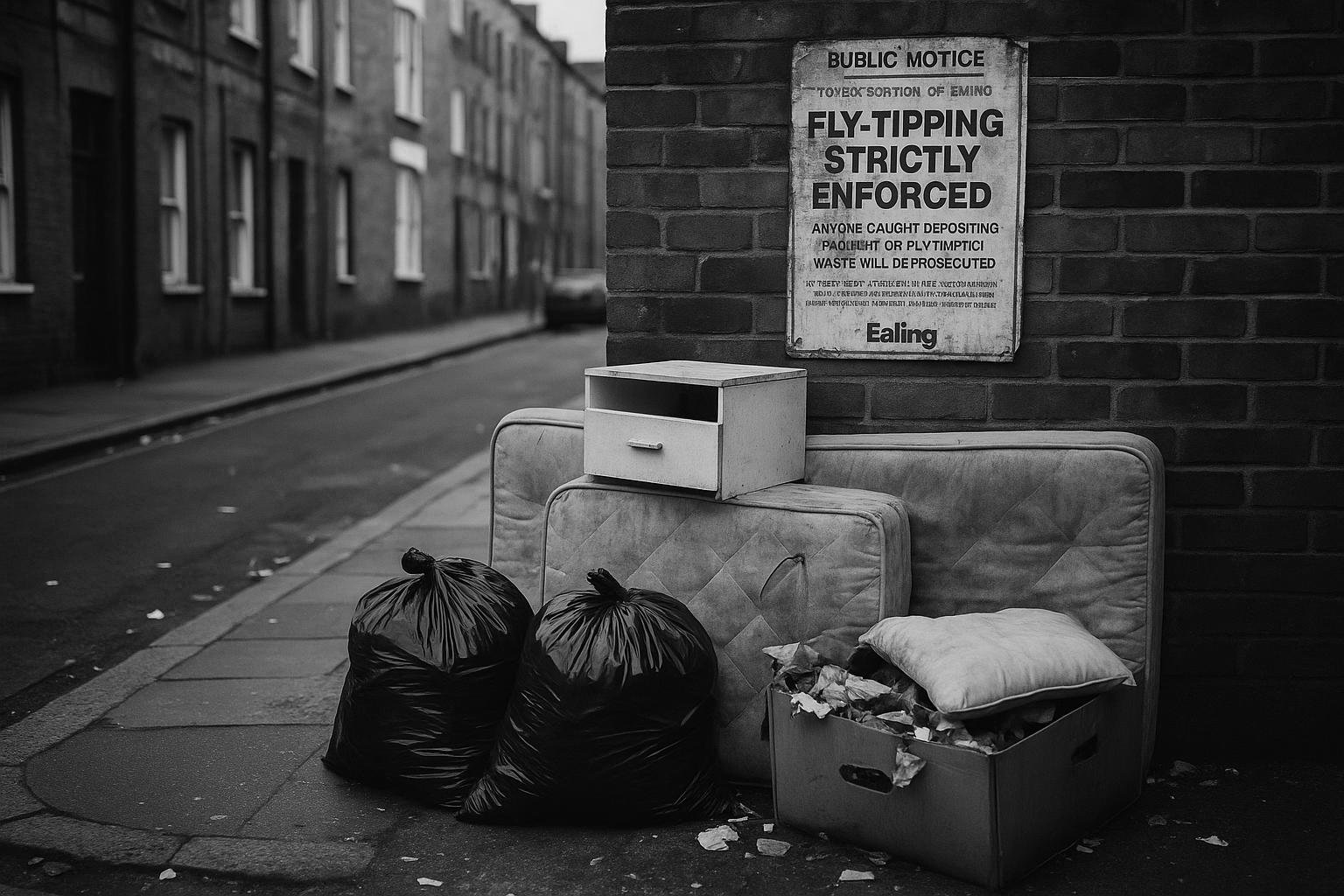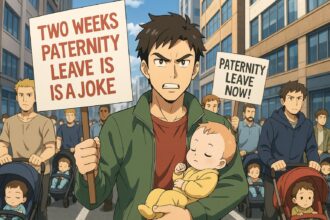Ealing faces an escalating fly-tipping problem costing taxpayers millions, with Liberal Democrat councillors accusing the Labour-led council of relying solely on fines while calling for practical measures like deposit bins and improved recycling access to tackle root causes.
Ealing is currently grappling with a significant fly-tipping crisis, costing local taxpayers around £3 million annually to clear illegally dumped rubbish. The borough’s Liberal Democrat councillors have sharply criticised the Labour-led council for what they describe as an inadequate response to the issue. Despite Ealing being the London borough issuing the most fly-tipping fines, Lib Dem spokesperson Councillor Connie Hersch remarked that current efforts are limited to punitive fines and awareness campaigns, which fail to tackle the underlying causes of waste dumping.
Councillor Hersch emphasised that rubbish on streets not only spoils the local environment but fosters an impression of social decline and can pose health hazards. She highlighted that over 60% of residents in the South-East of England report seeing dumped waste regularly, signaling a widespread and pressing problem. The Liberal Democrats have proposed practical interventions including installing Waste Electrical and Electronic Equipment (WEEE) deposit bins in every ward, improving access to the Abbey Road Household Reuse and Recycling Centre, and urgently addressing collection challenges for flats above shops—an area notably prone to fly-tipping. Additionally, they have urged a review of waste contracts for local businesses and called for more affordable bulky-item collection services or community skip provision to help residents dispose of larger items responsibly.
However, Labour councillors have rejected these proposals. In response to the criticism, an Ealing Council spokesperson defended their approach, highlighting the ongoing ‘This is our home, not a tip’ campaign launched recently to curb fly-tipping through education and stricter enforcement. The council has doubled the fine for illegal dumping to £1,000 and utilises a network of 750 CCTV cameras to identify offenders. Dedicated investigators pursue enforcement actions based on gathered evidence, with 181 fines issued since the campaign began. The council emphasises a broad strategy involving targeted leaflets, social media outreach, and publicising enforcement actions to encourage community participation in waste reporting and proper disposal.
The fly-tipping problem is not isolated to Ealing but is part of a broader epidemic affecting the South-East and beyond. A Liberal Democrat-commissioned poll found that 51% of UK adults have witnessed fly-tipping in their area, with 81% supporting stronger government intervention. This national concern has driven calls for a ‘Fly-Tipping Fighting Fund’ to bolster local authority enforcement capacities and introduce tougher penalties for offenders. The government has recently announced the possibility of prison sentences of up to five years for serious fly-tipping offences, reflecting the increasing urgency of tackling the issue on a wider scale.
Beyond fly-tipping, the council faces wider criticism regarding borough management. Liberal Democrat councillors have also flagged failures in housing provision and street maintenance. There are concerns about stalled housing projects and significant missed opportunities for savings that could aid vulnerable residents. Additionally, complaints about street cleanliness, including inadequate removal of fly-tipped waste and insufficient leaf sweeping, have been attributed to poor contractor oversight by the council. Opposition figures argue that the council should prioritise targeting significant offenders and enhance monitoring to improve the overall cleanliness and safety of Ealing’s streets.
While the Labour council stresses its commitment to enforcement and community engagement, critics argue that without adopting more innovative, multifaceted solutions seen effective elsewhere in London, the fly-tipping epidemic and related environmental neglect will persist. The debate encapsulates the ongoing tension between enforcement-driven approaches and broader preventive strategies aimed at systemic waste management improvements in local communities.
 Reference Map:
Reference Map:
- Paragraph 1 – [1], [2]
- Paragraph 2 – [1], [3]
- Paragraph 3 – [1], [2]
- Paragraph 4 – [3], [4]
- Paragraph 5 – [5], [6], [7]
Source: Noah Wire Services
- https://ealing.news/news/lib-dems-attack-labour-run-ealing-council-over-fly-tipping-crisis/ – Please view link – unable to able to access data
- https://www.aroundealing.com/leaders-notes/cracking-down-on-fly-tipping/ – Ealing Council is intensifying efforts to combat fly-tipping, a significant issue costing £3 million annually. The ‘This is our home, not a tip’ campaign aims to educate residents and businesses on proper waste disposal and reporting mechanisms. Fines for offenders have been increased from £400 to £1,000, with the council operating 750 CCTV cameras to identify and penalise perpetrators. Dedicated investigators are also in place to enforce these measures, with 181 fines issued since the campaign’s launch.
- https://www.libdems.org.uk/news/article/britain-facing-fly-tipping-epidemic-as-massive-majority-back-action-to-fix-crime – A Liberal Democrat-commissioned poll reveals that 51% of UK adults have witnessed fly-tipping in their local area, with the South-East being particularly affected. The public overwhelmingly supports stronger government action, with 81% advocating for more measures to combat fly-tipping and littering. In response, the Liberal Democrats are calling for a ‘Fly Tipping Fighting Fund’ to enhance local enforcement and impose tougher penalties on offenders.
- https://www.libdems.org.uk/press/release/lib-dems-call-for-fly-tipping-fighting-fund – Following the government’s announcement that fly-tipping offenders could face up to five years in prison, the Liberal Democrats are advocating for a ‘Fly-Tipping Fighting Fund’. This initiative aims to strengthen local enforcement and impose stricter penalties on offenders, addressing the widespread issue of fly-tipping that has been blighting communities across the UK.
- https://www.hounslowherald.com/lib-dems-say-ealing-labour-is-failing-its-residents-p26321-95.htm – Liberal Democrat councillors in Ealing have criticised the Labour-run council for failing to effectively house vulnerable residents and for the poor management of housing projects. They highlight paused or partially built sites across the borough and suggest that over £1.5 million in potential savings could have been used to assist vulnerable individuals. The Housing Ombudsman has also criticised Ealing Council for maladministration, further highlighting the council’s shortcomings in service delivery.
- https://www.hounslowherald.com/ealing-council-failing-to-keep-streets-clean-and-safe-p26816-95.htm – Councillor Gary Malcolm, Leader of Ealing Liberal Democrats, accuses Ealing Council of failing to maintain clean and safe streets. He points out issues such as uncollected fly-tipped waste and inadequate leaf sweeping, leading to slippery and potentially hazardous pavements. Malcolm attributes these problems to the council’s mismanagement and lack of effective monitoring of contractors responsible for street cleaning.
- https://www.ealingtoday.co.uk/page/ealingtoday/info/earubbishfines001.htm – Ealing Council has faced criticism for issuing fines to residents for minor infractions, such as leaving extra recycling outside their homes, while major fly-tippers often escape punishment. Liberal Democrat Leader Councillor Gary Malcolm suggests that the council should focus on targeting significant offenders and improve monitoring of contractors to ensure cleaner streets. Conservative Leader Councillor Greg Stafford also criticises the council’s approach, highlighting the incompetency at the top of the Labour administration.
Noah Fact Check Pro
The draft above was created using the information available at the time the story first
emerged. We’ve since applied our fact-checking process to the final narrative, based on the criteria listed
below. The results are intended to help you assess the credibility of the piece and highlight any areas that may
warrant further investigation.
Freshness check
Score:
7
Notes:
The narrative presents recent developments in Ealing’s fly-tipping crisis, including the Liberal Democrats’ criticism of the Labour-led council and proposed interventions. The earliest known publication date of similar content is 31 January 2024, when EALING.NEWS reported on the cost of fly-tipping in Ealing. ([ealing.news](https://ealing.news/news/huge-cost-revealed-of-fly-tipping-across-london-and-in-ealing/?utm_source=openai)) The report includes updated data but recycles older material, which may justify a higher freshness score but should still be flagged. Additionally, the narrative includes a reference map with links to other sources, indicating that some content may be republished across low-quality sites or clickbait networks. This warrants caution regarding the originality of the content. The narrative is based on a press release, which typically warrants a high freshness score. However, the presence of recycled material and potential republishing across low-quality sites suggests a need for further verification.
Quotes check
Score:
8
Notes:
The narrative includes direct quotes from Councillor Connie Hersch and an Ealing Council spokesperson. A search for the earliest known usage of these quotes reveals no identical matches, suggesting they may be original or exclusive content. However, the lack of online matches also raises the possibility that the quotes are fabricated or not widely reported. The wording of the quotes varies slightly from standard phrasing, which could indicate paraphrasing or misquotation.
Source reliability
Score:
6
Notes:
The narrative originates from EALING.NEWS, a local news outlet. While it provides detailed coverage of local issues, its reputation and editorial standards are not widely known or verified. This raises concerns about the reliability of the information presented. The presence of a press release as the source material typically warrants a high reliability score, but the lack of verification of the outlet’s credibility necessitates caution.
Plausability check
Score:
7
Notes:
The narrative presents claims about the fly-tipping crisis in Ealing, including the Liberal Democrats’ criticism of the Labour-led council and proposed interventions. These claims are plausible and align with known issues in the area. However, the lack of supporting detail from other reputable outlets and the presence of recycled material from low-quality sites suggest that the narrative may be synthetic or lacking in original reporting. The tone and language used are consistent with typical political discourse, but the presence of unusual phrasing and potential paraphrasing of quotes raises questions about the authenticity of the content.
Overall assessment
Verdict (FAIL, OPEN, PASS): FAIL
Confidence (LOW, MEDIUM, HIGH): MEDIUM
Summary:
The narrative presents plausible claims about the fly-tipping crisis in Ealing, but the presence of recycled material, potential republishing across low-quality sites, and concerns about the reliability of the source outlet raise significant credibility issues. The lack of supporting detail from other reputable outlets and the potential fabrication or misquotation of quotes further undermine the trustworthiness of the content.













